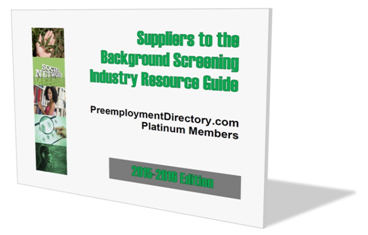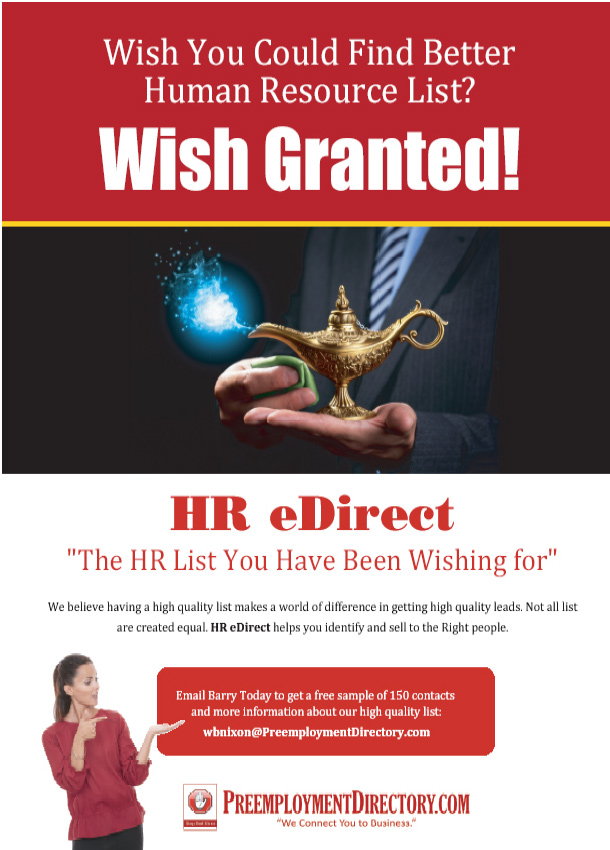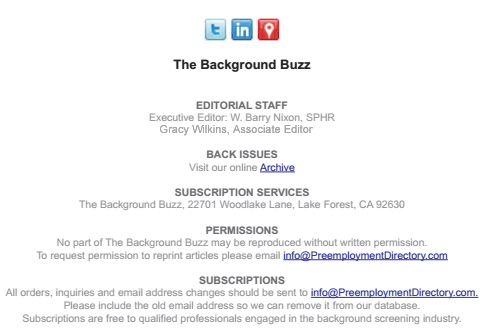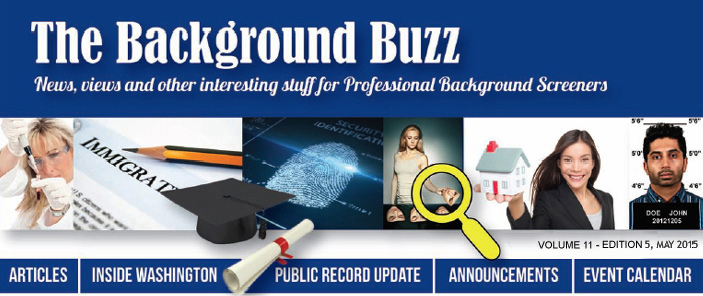 |
Lumelang! (Good Day in Sesotho an official language of Lesotho) Thanks to all of you who have welcomed me to the Atlanta area. I particularly appreciate the tips on how to understand what people are saying to being forewarned that ordering something ‘with everything’ will mean I will get coleslaw added to it to recommendations for great barbeque places. Keep those tips coming. I greatly appreciate it. As you know, we now have two great ways for CRAs to reach out to the HR community. First, there is our industry leading 2015-16 Annual Background Screening Industry Resource Guide which we will launch at the SHRM Annual Conference in June in Las Vegas. This year we will be distributing the Guide to 30,000 HR Managers (up from 20,000 in 2014.) We are frantically trying to get this to the printer so that we will have in time for the SHRM conference. Thanks to all of you who joined us in this years’ Resource Guide. Second, as you know, we have launched our new HR eDirect Mail Service which will make available to you more than 200,000 HR Managers. We are selling our HR email list on a state by state basis. Click here to read about the service. The response to this new service has been really good, Email me at wbnixon@Preemploymentdirectory.com to try out a complimentary sample of up to 100 HR email contacts. If you are going to be attending the SHRM Annual Conference be sure to come by an visit us at booth 3318 and pick up a fresh new copy of the 2015-16 Annual Background Screening Industry Resource Guide. Also for those of you who are interested in knowing what is happening in the dynamic world of international background screening be sure to check out our newest newsletter - The Global Background Screener. Click here to see the most recent edition. Thanks for joining us this month and have a great summer! P.S. Sesotho and English are both official languages of Lesotho (formerly Basutoland) |
US ARTICLES:
INTERNATIONAL ARTICLES:
|
![]() IN THIS EDITION
IN THIS EDITION
![]()

![]()
Breach of Background-checks Database May Lead to Blackmail Newly released documents show how hackers infiltrated servers used by US Investigations Services (USIS), a federal contractor which conducts background checks for DHS. Representative Elijah Cummings said more than 27,000 personnel seeking security clearances likely were affected by the USIS breach. Similar hacks also affected servers at the Office of Personnel Management (OPM), which holds information on security clearance investigations. Once hackers have a list of employees who possess government security clearances, they can exploit other aspects of those employees’ lives for malicious gain. Although the hack could suggest nation-state involvement, private entities could have had a reason to want the biographies of individuals with security clearances.
CFPB Report Outlines Legal Violations Uncovered Over the past several years, the CFPB has been examining consumer reporting agencies to see how they handle consumer disputes. While Bureau examiners found great improvements in how some handle disputes in its most recent exams, one or more agencies are still failing to consistently forward all relevant consumer information to furnishers. In addition, examiners found deficiencies in the updating of public record information, leading to errors in the updating of files after a reinvestigation and in the reporting of dispute results to consumers. Source: ESRCheck
35% of
Employers Less Likely to Interview Applicants They Can’t Find
Online
Chinese Immigration Surpasses Mexican America's Community Survey conducted by the US Census Bureau has produced a graph showing a collapse of immigration from Mexico from over 350,000 in 2005 to a mere 125,000 in 2013. During the same time Chinese immigration grew from around 50,000 in 2005 to 147,000 in 2013. The collapse of Mexican immigration can be traced to several factors, the most fundamental one being demographic. The number of live births per woman in Mexico has been diving and has fallen from 6.7 children in 1970 to 2.2 children in 2013. As countries approach and cross that number downward, strong demand for labor in the country absorbs most of the labor and dramatically reduces migration out of the country.
Criminal records are surfacing in screeners’ reports even after being purged from government databases. There is no national data on how often expunged records are reported by background-check companies, because expunged records by definition no longer exist. But consumer advocates say the number has grown along with the demand for such services by employers and landlords, among others. The screening companies point to their own research showing that only a tiny fraction of applicants contest the accuracy of their reports each year. Consumer advocates say the onus is on screeners to investigate discrepancies among government records and make sure their reports convey up-to-date information.
Recent Ruling in San Diego, California May Affect Residency Laws for Sex Offenders and Tenant Screening A recent ruling in San Diego, California dramatically alters residency requirements for registered sex offenders and could, eventually alter tenancy requirements across the country. Adam Almeida, President and CEO of TenantScreeningUSA.com states: "The legal decision in San Diego sets a precedent that will alter how tenant checks are reviewed." A voter-approved California law that prohibits registered sex offenders from living within 2,000 feet of a school or park violates offenders’ rights — and fails to protect the public — in an urban county where most available housing and services are in the restricted zone, the state Supreme Court ruled. This recent change could greatly affect landlords and/or property managers, especially those with properties within the 2,000-foot threshold.
|
|||||||||||||||||||||||||||||||||||||
| NYC Mayor Bill DeBlasio signed a bill (Int. 0261-2014) that amends the City’s Human Rights Law to prohibit most employers from inquiring into or considering a prospective or current employee’s credit history when making employment decisions. The law will take effect on September 3, 2015. NYC’s new law is among the broadest bans in the nation and will effectively eliminate the use of credit history for many employers in the City. NYC employers should start to review their background check policies and make any necessary changes. The price for non-compliance is steep, as the law affords aggrieved applicants and employees a private right of action with the promise of generous remedies.
A $1.8 million class action settlement has been reached to resolve charges against Home Depot over allegedly violating the FCRA by not having proper background check forms for its job applicants. According to the agreement, Class Members will receive anywhere from $15 to $100. The proposed class includes about 120,000 individuals who applied for jobs with Home Depot, in which the alleged illegal background check forms were used, beginning in April 24, 2011 to May 11, 2015. “In addition to this monetary relief, Home Depot has agreed to no longer use the offending forms, and to use a background check form that complies with the FCRA,” the motion to approve the Home Depot class action settlement says. According to the Home Depot class action lawsuit, the retailer “violated the FCRA by including releases of liability in their preauthorization background and/or credit check disclosure forms.”
New Montana
Law Protects Employee Social Media Accounts
Koch
Industries Decision to ‘Ban The Box’ Signals Broad, Growing
Appeal for Fair-Hiring Practices
A construction worker who lost his job on Apple’s new campus because of a 2008 felony conviction said he filed a complaint with the EEOC alleging discrimination. The complaint could trigger an investigation of the tech giant’s hiring practices, which became the subject of controversy when Apple was barring felons from construction jobs. If the commission sues, it could chart legal territory regarding criminal histories and employment. The commission has sued companies like BMW and Dollar General for their hiring practices involving criminal background checks. Those cases are still pending. But experts say there have been relatively few legal challenges. “It is somewhat an underdeveloped area of the law,” said Lisa Klerman, director of the USC Gould School of Law Mediation Clinic.
The House approved a bill to ban employers from asking about a job candidate's criminal history on an application. The bill is a watered-down version from what lawmakers first proposed. The original House Bill would have prohibited employers from conducting a background check before a conditional job offer; the amended version allows them to discuss an applicant's criminal record at an interview. Democratic supporters say the new version still gives applicants a chance to discuss their criminal record face to face with employers. Portland Mayor Charlie Hales recently pushed for a similar city ordinance but tabled it after business groups expressed concern that it would burden employers.
Introduced by Reps. Luke Messer (R-Ind.) and Jared Polis (D-Colo.), a new measure would bar school technology vendors from selling student information to third parties or from creating student profiles for non-educational purposes. The bill is known as the Student Digital Privacy and Parental Rights Act. Some in the tech industry have worried such restrictions could prevent the legitimate use of student data to invent new products and tailor existing ones to individual student’s needs. The bill tries to account for this concern by allowing providers to use data to personalize students’ learning and improve products with de-identified student data. On May 19, Gov.
Dannel P. Malloy signed into law Public Act No. 15-6, titled "An Act
Concerning Employee Online Privacy." The act applies to both employees
and job applicants and prohibits employers from requiring or requesting
employees or applicants to (1) provide the employer with a user name,
password, or other means to access the employee's or applicant's personal
online account (such as e-mail, social media and retail-based Internet
websites); (2) authenticate or access a personal online account in
the presence of the employer's representative; or (3) invite, or accept
an invitation from, the employer to join a group affiliated with any
personal online account. The act is effective October 1.
FCRA Lawsuit Against Bank of America Denied U.S. District Judge Consuelo B. Marshall, a federal judge, in the California Central District Court has denied a class action lawsuit that claimed Bank of America NA violated the federal Fair Credit Reporting Act (FCRA) by obtaining consumer reports for background checks on prospective and current employees using authorization disclosures that did not comply with the FCRA. Judge Marshall ruled that both authorization forms used by bank of America were “clear and conspicuous,” disclosed that a consumer report may be obtained for employment purposes, were in a document that consisted solely of the disclosure, and that the plaintiffs each authorized the procurement of their consumer reports. The Court found that the authorization forms used by Bank of America met the FCRA’s disclosure requirements. The case is Newton v. Bank of America, National Association et al, 2:14-cv-03714, in the California Central District Court. Source: ESRCheck, ESR News Blog
What Will Legal Marijuana Cost Employers? Some 23 states have legalized medical marijuana, four plus the District of Columbia have legalized the drug for recreational use. This growth in the marijuana industry creates two sets of problems for employers: increased marijuana use – and all the costs this brings in the form of accidents and lost productivity – and costly litigation. Employers face costly litigation as case law surrounding legal marijuana develops. There are several things employers can do to protect themselves. 1) Stay up to date with the changing legal landscape and adjust your workplace policies accordingly. 2) Remember that marijuana is still illegal under federal law. 3) Band together with other employers to monitor state legislation. 3) Take action with legislators to ensure workplace protections are included in any marijuana laws. 4) Educate your workforce about the dangers marijuana poses to children, families, and the workplace. 5) Challenge the notion that marijuana is medicine, or you may soon be paying for it in your health insurance program. No marijuana medicines being sold in states that legalized them have been approved by FDA as pure, safe, or effective. Doctors cannot prescribe them and pharmacies cannot sell them.
Marijuana
in the Workplace
Federal Government Study Shows Persistent Substance Abuse In U.S. Workforce Data from the SAMHSA study for the 2008-2012 periods indicated that an annual average of 8.7% of full-time workers in the 18-64 age range used alcohol heavily in the past month, 8.6% used illicit drugs in the past month, and 9.5% were dependent on or abused alcohol or illicit drugs in the past year. Demographics play a role in the data. Prior research shows heavy alcohol use and illicit drug use are more common among males and younger workers (through age 34), than among females and older workers (age 35 and above). Industries with younger, predominantly male workers thus were found to have higher alcohol and drug use rates. However, researchers reported no discernible trend toward increased or decreased substance use in the data for this period compared to that for 2003 through 2007. SAMHSA observed: “An effective substance abuse testing policy may help employers reduce the incidences of drug and alcohol abuse in their workplaces.
Workplace Drug Testing in the Era of Legal Marijuana The passage of public ballot and legislative initiatives has resulted in medical marijuana laws in 23 states and the District of Columbia and approval of legal recreational use of marijuana by adults in Colorado and Washington in 2012, and in Alaska, Oregon, and the District of Columbia in 2014. This shift in drug policy has created significant concern and confusion for many employers, employees, and job applicants about workplace drug testing in general and testing for marijuana specifically. This report provides guidance for employers about drug testing employees and job applicants for marijuana use in the workplace in the context of the current legal environment. It also discusses improvements in the science and technology of drug testing not only for marijuana but for other drugs of abuse. The recommendations made in this report to update workplace drug testing respond to the rapidly changing drug abuse environment in the workplace. DOT Approves Electronic Forms for Drug Testing The Final Rule allows employers, collectors, laboratories, and Medical Review Officer to use the electronic version of the Federal Drug Testing Custody and Control Form (eCCF) in the DOT-regulated drug testing program. The FR can be viewed at (http://www.gpo.gov/fdsys/pkg/FR-2015-04-13/pdf/2015-08256.pdf). The final rule is effective April 13, 2015. Employers and their service agents can begin using the eCCF only when the employer’s laboratory has been approved by the Department of Health and Human Services National Laboratory Certification Program (NLCP). For more information regarding this approval process, contact NLCP at 919-541-7242 or at nlcp@rti.orgds the DOT’s definition of the CCF to include the OMB-approved eCCF.
Public
Record Update
The Le Brea tar pits in Los Angeles contain fossils ranging from saber tooth cats to Mammoths to dire wolves. If you are typical of many Consumer Reporting Agencies and have been in business any length of time your files probably contain some fossilized contracts with clients—contracts that do not contain all the stipulations that are required to become accredited. At the NAPBS accreditation meeting in Nashville, the question came up about these "fossilized contracts." The question was "The accreditation standard requires that our contract with employers contain certain stipulations. If our existing contract does not contain a required stipulation, do we have to go back to several hundred clients and get them to sign a new agreement that does contain the missing stipulation or, can we just revise our contract to contain the stipulation and go forward?" The answer was
that you do NOT have to go back and get previous clients to sign new
contracts—but you DO need to revise your current contract and
use it going forward. Many CRAs have reviewed the accreditation standard
for client agreements, looked at their client agreement, looked at
their client list, pondered the process for having all these clients
sign a new agreement—and taken a nap on accreditation. The flexibility
of grandfathering some of these contracts should wake you up from
your nap if this has been the problem.
PRRS is the ultimate public record resource! Subscribers have in seconds all the essential information about how to access public records directly from 26,000+ government agencies and institutions at the county, state and federal levels. Subscriber know all access methods (including if online), indexing and search requirements, restrictions, and fees. The Courts Section informs you when online searching is or is not equivalent to onsite research for most courts. PRRS consists of 7 individual BRB databases. Subscriptions are also offered on an ala carte basis.
Public Record
Retriever Network - www.PRRN.us
Latest Study from First Advantage Reveals Background Screening Trends in Asia Pacific First Advantage, announced the release of the First Advantage 2014 Background Screening Trends Report for Asia Pacific. Employees remain the most valuable assets in any organisation and with multinational companies expanding their footprints in Asia Pacific region, the challenges associated with hiring the right candidates have increased. To ensure that the most suitable talent comes on board, it is imperative to be aware of the candidate's background. First Advantage conducts 2 million background checks a year in Asia Pacific and found a 6.5% increase in candidates misrepresenting their curriculum vitae ( CV). It is therefore extremely important for the employers to perform thorough background checks on their candidates, which can help in avoiding unwarranted situations that may be instrumental in compromising the security or integrity of their organisations. This latest study reveals key macro and micro trends and also provides the insight for organizations to benchmark their current programs and fine-tune their existing screening practices.
SPONSORED
BY
The
2015-16 SUPPLIERS TO THE BACKGROUND DOWNLOAD YOUR COPY OF THE 2015-16 BUYERS GUIDE NOW!
 Nicole A. Kersey Nicole A. Kersey Managing Director, Kersey Immigration Compliance, LLC nkersey@kerseyimmigration.com Nicole A. ("Nici") Kersey is an attorney whose practice is dedicated to employment-based immigration, with a focus on the Form I-9, E-Verify, and related immigration compliance issues. Nici represents employers before, during, and after Form I-9 inspections by Immigration and Customs Enforcement (ICE), providing practical advice to and serving as an advocate for employers during negotiations and litigation relating to fines for I-9 violations. She is a frequent trainer and speaker on I-9 and E-Verify issues. Nici is a graduate of the University of Virginia School of Law and provides pro bono representation to the spouses of U.S. soldiers and to arts organizations. The Challenge Question: Why is there
a telephone number field on the I-9? A.
To allow the government to contact the employee if necessary.
Hiring
Undocumented Workers May Cost Companies Their Healthcare Plans
Rick
Perry's E-Verify Order Contradicts Hiring Regulations
Jobless Claims in U.S. Fall Over Past The average number of Americans filing for unemployment benefits over the past four weeks dropped to a 15-year low, a sign the labor market continues to strengthen. The four-week average for jobless claims decreased to 266,250 in the period ended May 16 from 271,750, a Labor Department report showed Thursday in Washington. “It’s
indicative of a labor market that’s showing no signs of reversal
even if the pace of job growth is going to slow,” said Eric
Green, head of U.S. economic research at TD Securities USA LLC in
New York. Whether it’s 260,000 or 274,000, “the theme
here is claims are very low.”
We can help you have a high quality e-newsletter to help nurture your relationship with your clients and attract new clients. Our customized newsletter service will take over your newsletter task or create a new one for you. We can manage the creation of your newsletter for you. We are constantly researching information to use for The Background Buzz and you can put our research to use for you. Using the information rich content from The Background Buzz (minus the ads and competitors information) we will create a custom newsletter for you. Use your staff’s time to do more valuable work and save all the hassle of researching or writing articles, formatting and managing all the other ezine tasks with our customized ezine process. Contact Barry Nixon at 949-770-5264 or at wbnixon@PreemploymentDirectory.com for more information.
Interim Order Permitting Drug and Alcohol Testing To Continue Upheld In
Teck Coal Limited v United Steel, Paper and Forestry, Rubber,
Manufacturing, Energy, Allied Industrial and The arbitrator
had noted the existence of extensive and substantial evidence to support
the employer’s case Source: Norton Rose Fulbright blog network, click here to go to original Case Note Germany Toughens up on Data Retention German policymakers have moved to strengthen data retention laws, insisting that information will only be stored in Germany, and for much shorter periods, after the European Court of Justice struck down EU legislation that required data storage for longer periods. In 2010, Germany's constitutional court struck down a previous data retention bill on grounds that it violated users' privacy by broadly collecting and storing data from all users. That law allowed for data storage in Germany, or other EU countries, for six months. The new draft bill states that data must be stored in Germany, which has been rocked by revelations over US data espionage since 2013.
Visit the Job Board for the Employment and Tenant Screening Industry. Here you will find resumes of people with industry experience and employers seeking applicants with experience in Employment and Tenant Screening and related businesses. www.backgroundscreeningjobs.com
Feature Education:
2015 Events ( Click Here to View full list of Events ) - Updated Monthly SHRM State Conferences, visit http://www.shrm.org/Conferences/StateAffilliateConferences/Pages/default.aspx Drug
and Alcohol Testing Industry Association (DATIA), 2013 Training Course
Schedule, visit SAPAA Training Institute Learning Events, http://www.sapaa.com/ CUPA-HR Conferences: http://www.cupahr.org/ World Federation of People Management Associations, Events, http://www.wfpma.com/events/by-region#quicktabs-tab-view__events__page_3-4
|
| Disclaimer Statement: All information presented is for information purposes only and is not intended to provide professional or legal advise regarding actions to take in any situation. Advertisements are presented for information and marketing purposes only and the National Institute for Prevention of Workplace Violence, Inc. makes no representations for any products or services that are promoted and accepts no responsibility for any actions or consequences that occur as a result of any purchases from advertisers. |
 EDITOR'S
MESSAGE
EDITOR'S
MESSAGE 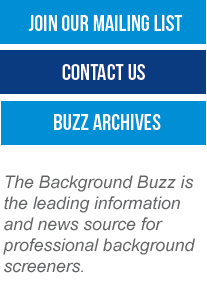

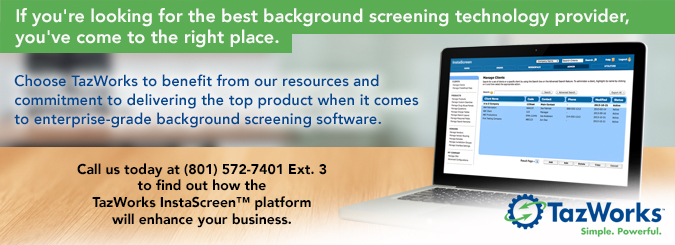

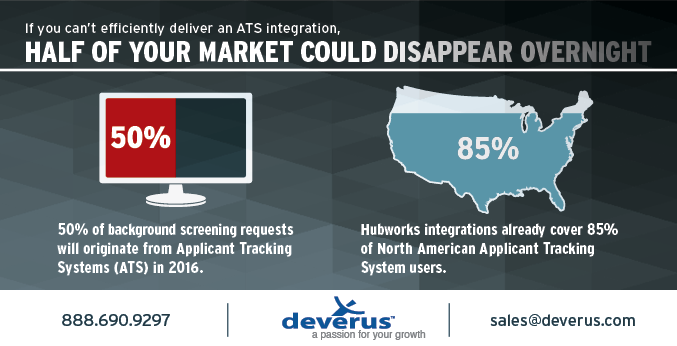
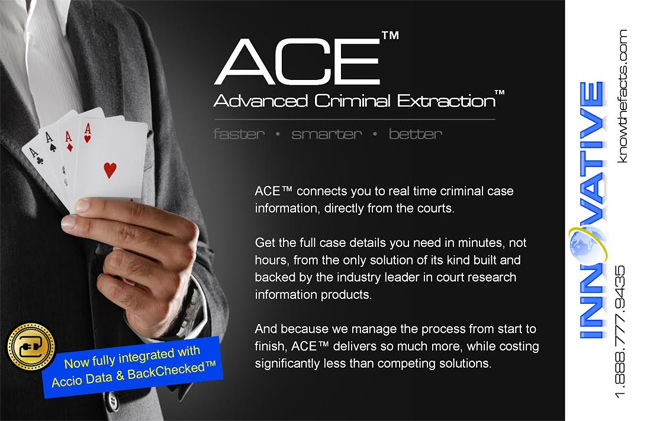




 Kevin Coy is a Partner in the Washington DC office of Arnall
Golden Gregory LLP. Kevin
Kevin Coy is a Partner in the Washington DC office of Arnall
Golden Gregory LLP. Kevin 